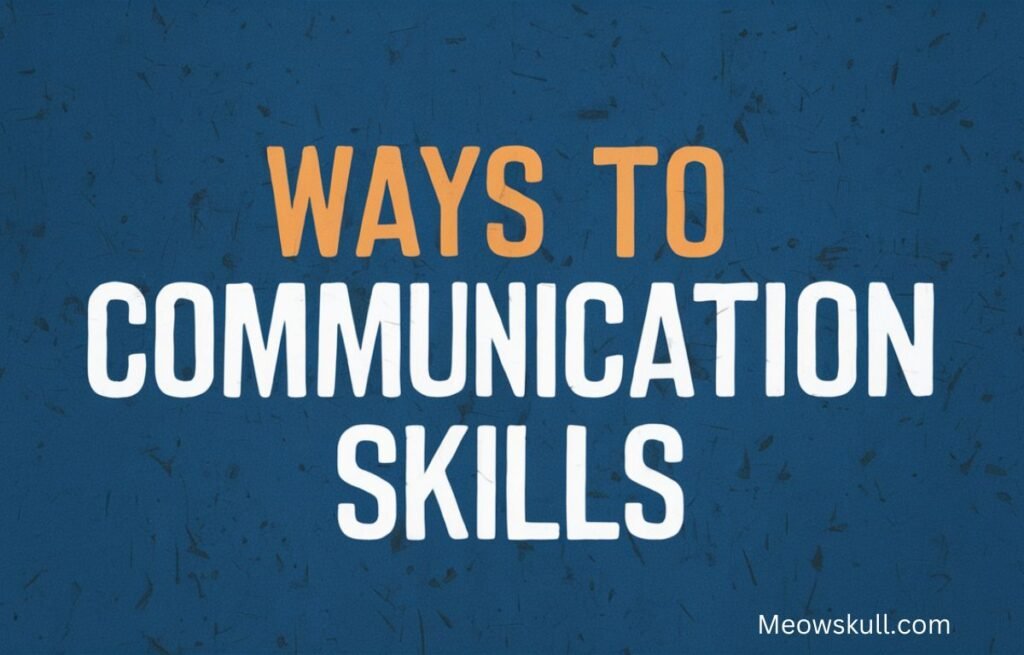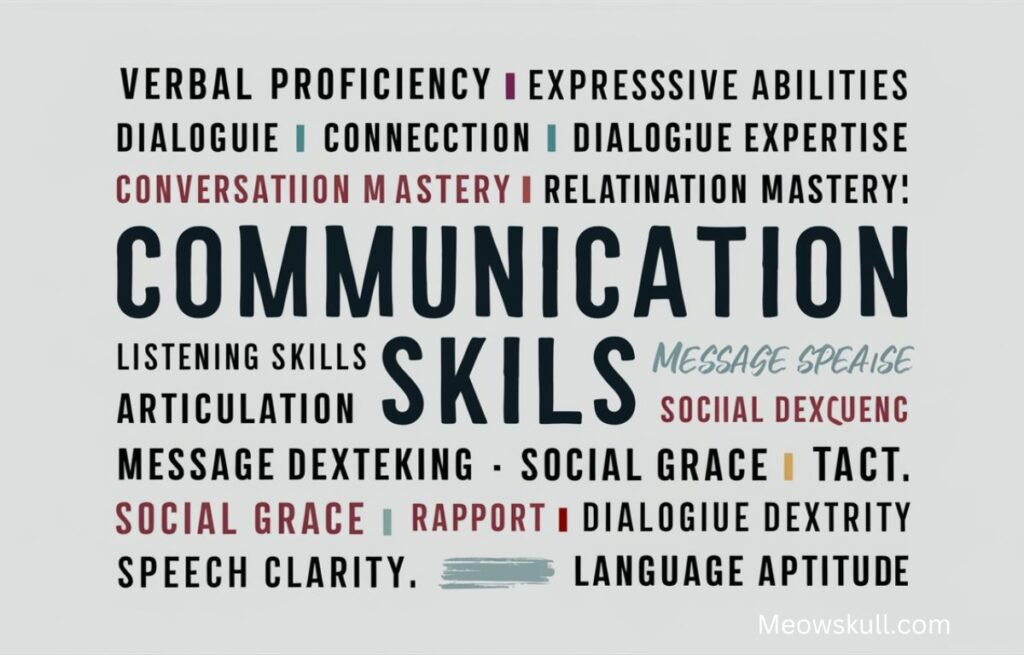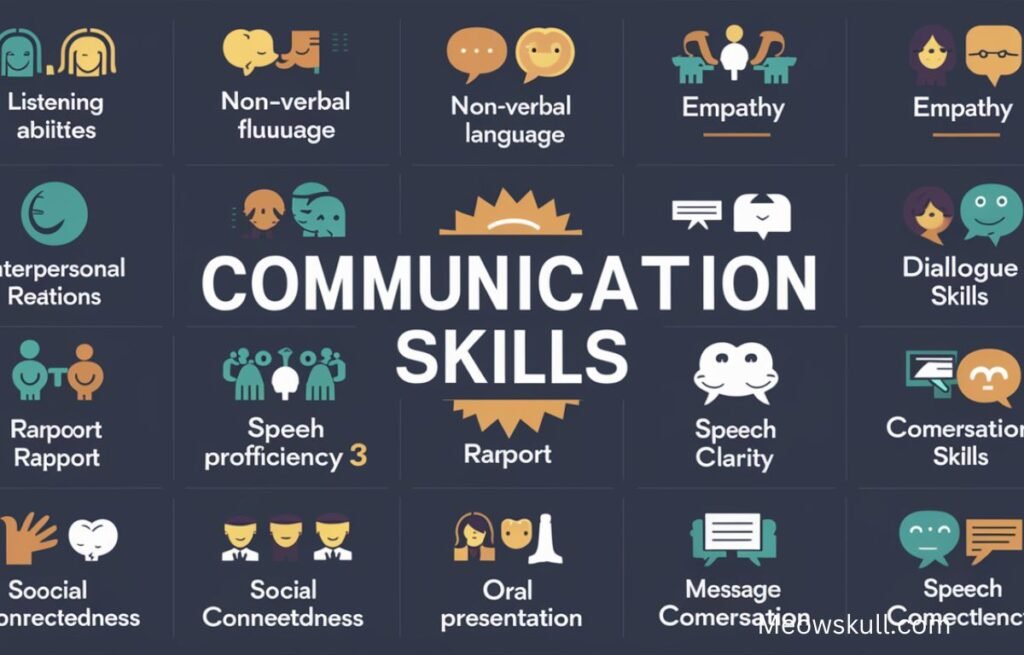When you think about communication skills, what comes to mind? Most people immediately think of talking, writing, or maybe even listening. But in today’s fast-paced world, being able to communicate effectively is much more than just saying the right words. It’s about connecting, understanding, and sharing ideas in ways that are clear, concise, and impactful.
But here’s the thing – the term “communication skills” has been used so much that it’s almost lost its meaning. Whether you’re writing a resume, drafting a cover letter, or just trying to express yourself better, finding alternative phrases for communication skills can give your language a fresh and modern twist.
Let’s dive into 17 different ways to say “communication skills” that can make you sound more polished, professional, and powerful.
1. Interpersonal Abilities
When you want to highlight your ability to interact with others effectively, “interpersonal abilities” is a strong alternative. This phrase shows that you’re good at building relationships, understanding others’ perspectives, and working well in teams.
2. Verbal Articulation
If you’re particularly skilled in speaking, “verbal articulation” is a great way to showcase it. This term emphasizes your capacity to express ideas clearly and effectively through spoken words.
3. Presentation Proficiency
Got a knack for presenting ideas to an audience? “Presentation proficiency” is a powerful way to describe this skill. It not only covers your speaking abilities but also your skill in organizing and delivering information in an engaging way.
Also Read: 17 Other Ways to Say “Looking Forward to Talking to You”
4. Expressive Capabilities

Sometimes, communication isn’t just about words; it’s about how you express yourself overall. “Expressive capabilities” can encompass verbal and non-verbal communication, including body language, tone, and facial expressions.
5. Written Communication Expertise
For those who excel in written correspondence, “written communication expertise” is a more precise way to describe this skill. It highlights your ability to craft clear, concise, and effective written messages, whether in emails, reports, or social media posts.
6. Collaborative Communication
When your communication is focused on teamwork, “collaborative communication” is a phrase that stands out. It shows that you can share ideas, listen to others, and work together to reach a common goal.
7. Conversational Fluency
“Conversational fluency” is perfect for describing the ability to hold engaging and effective conversations. It implies that you’re comfortable in discussions, whether formal or informal, and can keep the dialogue flowing smoothly.
8. Diplomatic Communication
In situations where tact and diplomacy are key, “diplomatic communication” is an excellent term to use. It suggests that you’re skilled in handling sensitive topics, negotiating, and communicating in a way that avoids conflict.
Also Read: 17 Other Ways To Say “Quick Learner”
9. Listening Proficiency

Often overlooked, listening is a crucial part of communication. “Listening proficiency” highlights your ability to listen actively, understand others’ points of view, and respond thoughtfully.
10. Public Speaking Skills
If you’re confident speaking in front of groups, “public speaking skills” is a straightforward way to describe this ability. It shows that you can engage an audience, present ideas clearly, and handle questions or feedback with ease.
11. Negotiation Abilities
Negotiation is a specific type of communication that involves finding common ground. “Negotiation abilities” emphasizes your skill in persuading, compromising, and reaching mutually beneficial agreements.
12. Engagement Expertise
“Engagement expertise” is a modern way to describe the ability to connect with others, whether through social media, marketing, or face-to-face interactions. It shows that you can capture attention and foster meaningful interactions.
13. Storytelling Skills
Storytelling is a powerful communication tool, especially in marketing and branding. “Storytelling skills” indicates that you can convey messages in a compelling and memorable way, making your ideas resonate with others.
14. Customer Interaction Abilities
For those in customer service, “customer interaction abilities” is a great way to describe your communication skills. It highlights your proficiency in understanding customer needs, resolving issues, and providing excellent service.
15. Team Collaboration Skills
When communication is focused on working with others, “team collaboration skills” is a precise term. It shows that you’re capable of sharing ideas, listening to input, and working together towards a common goal.
Also Read: The Ultimate Guide to the Fortnite Raven Team Leader
16. Conflict Resolution Skills

Handling disputes requires a special type of communication. “Conflict resolution skills” emphasizes your ability to address disagreements, mediate conflicts, and find solutions that satisfy all parties involved.
17. Empathy in Communication
Finally, “empathy in communication” is an essential skill that involves understanding and sharing the feelings of others. It shows that you can connect on a deeper level, making your communication more effective and compassionate.
Conclusion
In today’s world, effective communication is more than just a basic skill – it’s an art. By using these 17 alternative phrases for “communication skills,” you can add variety, precision, and impact to your language. Whether you’re writing a resume, crafting a cover letter, or just looking to express yourself better, these terms will help you stand out and communicate your abilities more clearly.
Remember, the way you describe your skills can make a big difference in how they are perceived. So, choose the terms that best reflect your strengths and watch your communication – and your opportunities – soar.
FAQs
What are some good alternatives to “communication skills”?
Some effective alternatives include “interpersonal abilities,” “verbal articulation,” and “written communication expertise.” These phrases emphasize different aspects of communication, allowing you to highlight specific strengths.
How can I describe my communication skills on a resume?
You can use terms like “presentation proficiency,” “team collaboration skills,” or “customer interaction abilities” to describe your communication skills on a resume. These phrases are more specific and can make your resume stand out.
What is the best way to express strong verbal skills?
“Verbal articulation” is a strong phrase to express your ability to communicate effectively through spoken words. It highlights clarity, precision, and confidence in speaking.
How do I convey my ability to handle difficult conversations?
“Diplomatic communication” or “conflict resolution skills” are excellent ways to convey your ability to handle difficult conversations. These terms suggest that you can navigate sensitive topics with tact and find solutions during conflicts.
Can “listening proficiency” be considered a communication skill?
Yes, “listening proficiency” is a crucial communication skill. It emphasizes your ability to listen actively, understand others’ viewpoints, and respond appropriately, which are all key components of effective communication.
How can I showcase my storytelling ability in a professional setting?
You can describe your skill as “storytelling skills” or “engagement expertise.” These terms show that you can craft compelling narratives that resonate with audiences, whether in presentations, marketing, or everyday interactions.
What term should I use if I’m good at public speaking?
If you excel at public speaking, simply using “public speaking skills” is direct and effective. It clearly conveys your comfort and proficiency in addressing an audience.
How do I highlight my ability to work well with others?
“Team collaboration skills” or “collaborative communication” are ideal phrases to highlight your ability to work well with others. These terms show that you can share ideas, listen to feedback, and contribute to a team’s success.
Is “empathy in communication” important in the workplace?
Absolutely. “Empathy in communication” is essential in the workplace as it helps in building stronger relationships, understanding colleagues’ perspectives, and fostering a positive and collaborative work environment.
What’s a good way to describe skills in negotiation?
“Negotiation abilities” is a concise and clear way to describe your skills in negotiation. It emphasizes your ability to reach mutually beneficial agreements through effective communication.

As a seasoned contributor to “Meowskull”, Rosalie combines her linguistic prowess with a keen understanding of various topics, ensuring a delightful and informative reading experience. Her articles effortlessly blend clarity, creativity, and a touch of elegance, making language exploration an exciting journey for readers.